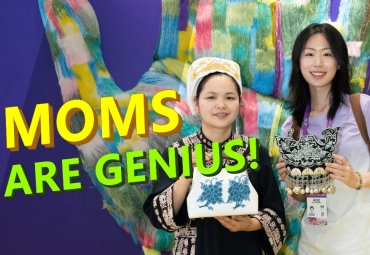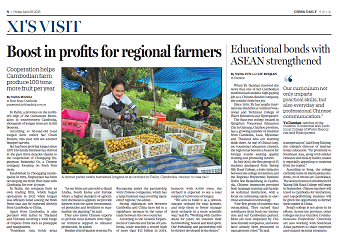Heroic epic of the Miao people a success story
In the Miao-Bouyei autonomous county of Ziyun in Southwest China's Guizhou province, locals are in awe of Chen Xinghua and his connection to a heroic legendary figure.
Chen, 75, is a national-level inheritor who recounts the sprawling heroic epic of King Yalu in the local language. The tale tells the story of King Yalu, a hero of the Miao ethnic group, and depicts the history and migration of the people.
The epic is usually presented on special occasions such as weddings and funerals. For more than 2,500 years, it was passed down orally in western Guizhou. Those who tell the stories of King Yalu are called Donglang, or singing artist, in the Miao language.
The epic has been listed as a major focus of the Chinese folk art heritage rescue project. It has come into the spotlight once again, as China observed this year's Cultural and Natural Heritage Day on Saturday.
"When I was just a boy, my elders demanded that I learn to sing and perform the stories of King Yalu properly," Chen recalls. "They believed learning the epic was like learning to speak."
During his teenage years, everyone in the village wanted to be a Donglang because it was deemed a sacred profession, Chen says. At the age of 16, Chen began to learn the epic from three local masters. With a strong memory, a good singing voice and oration skills, Chen soon understood the essence of the epic and by age 20, he had become a famous Donglang in the locality.
After learning the epic by heart, Chen began to perform it at funerals. He combined the stories he learned from his three masters and managed to piece together a long version of the epic. The abundant details he weaved into his version caught the eyes, and ears, of his fellow villagers.
As the Miao people do not have a written language, the epic was traditionally passed down in oral form. To help preserve the cultural heritage, Chen decided to transliterate the Miao words into Chinese characters. He scoured the county of Ziyun and visited many senior Donglang for different versions of the epic, trying to piece together as many stories of King Yalu as possible.
In 2009, Chen heard that the county's cultural museum had launched a program to compile the stories of King Yalu. He volunteered to participate, and sang the epic for four days so that the museum staff could record his version and translate it into the modern vernacular.
"As a national inheritor of the epic, I feel a heavy burden on my shoulders," Chen says. "Now that times have changed, maybe our way of passing down our heritage also needs to be adjusted."
In accordance with local Miao tradition, the masters only teach their apprentices about the stories of King Yalu in January and July on the lunar calendar. However, to better preserve the epic, Chen recorded his version and sent the recordings, as well as the Chinese texts, to his apprentices via smartphone so that they can learn more conveniently. His students are also free to call him at any time if they have any questions, he says.
But the passing down of King Yalu's stories is not an easy task.
Chen's hometown Ziyun sits along a long belt of arid, stony land in the provinces of Guizhou and Yunnan, and in Guangxi Zhuang autonomous region. The county of Ziyun is among the nine counties in Guizhou mired in grinding poverty. By 2019, Ziyun still had 12,940 people living under the poverty line.
The situation has forced many young people to go out and seek jobs in more developed areas of China.
"I have taught many apprentices in the past, but fewer than 10 of them have truly learned the essence of the epic," Chen says. "They are all working hard outside the county to make money and live better lives."
Fortunately, the government understands the importance of cultural protection and has taken a variety of measures to save the epic from dying out.
In 2011, the county government established a research center for King Yalu culture. The center compiles and translates the content of the epic and holds cultural exchange activities.
"We found that there are 1,778 Donglang in the county, and we have stored their stories in digital form," says Yang Zhengjiang, director of the center. "We also hold storytelling competitions and cultural seminars on the epic."
The center has also published a book containing 10,819 lines of the epic of King Yalu, Yang says.
In 2011, a cultural and tourism company was established in the county. The company has launched a variety of products based on the story of King Yalu, including embroidery and wax dyeing. It has provided job opportunities for more than 200 local people.
"I hope that more young people will join me in passing down the epic of King Yalu," Chen says.
All rights Reserved. 京ICP备13028878号-8







 Overview
Overview Guiyang
Guiyang Guian New Area
Guian New Area Liupanshui
Liupanshui Anshun
Anshun Qianxinan
Qianxinan Qiandongnan
Qiandongnan Qiannan
Qiannan Zunyi
Zunyi Tongren
Tongren Bijie
Bijie Guizhou commits to culture preservation and rural vitalization
Guizhou commits to culture preservation and rural vitalization Guizhou voice at 2025 national two sessions
Guizhou voice at 2025 national two sessions Meet the 'genius moms' at Shenzhen cultural fair
Meet the 'genius moms' at Shenzhen cultural fair 

